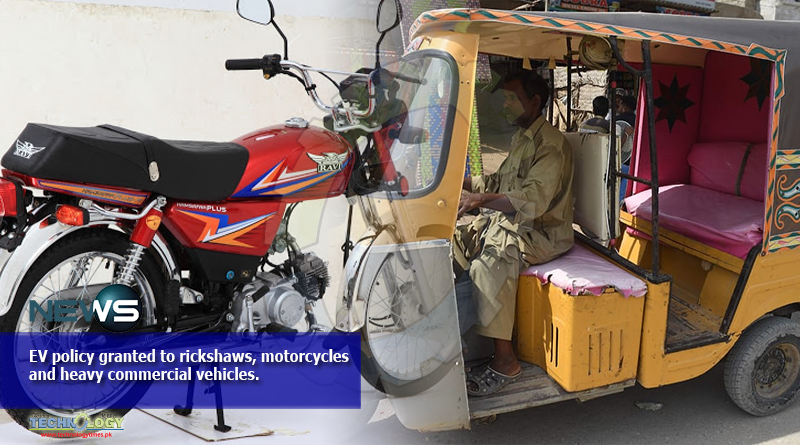The Electric Vehicle (EV) policy has been granted to rickshaws, motorcycles and heavy commercial vehicles by the The Economic Coordination Committee (ECC). This policy is for all the two-wheel or three-wheel commercial vehicles.

The Electric Vehicle (EV) policy has been granted to rickshaws, motorcycles and heavy commercial vehicles by the The Economic Coordination Committee (ECC). This policy is for all the two-wheel or three-wheel commercial vehicles.
After a good consultation with various stakeholders from the Ministry of Climate Change (MoCC), the Engineering Development Board (EDB), Ministry of Science and Technology, and several others, The EV policy was formulated by the Ministry of Industries & Production.
However the EV Policy 2019, presented by the MoCC, was earlier approved by the cabinet, the policy could not be put into action because of all objections raised by the MoIP and the EDB and some other stakeholders belonging to other institutes.
Furthermore, after a number of meetings among concerned ministries, it was thus decided that the EV policy would be revised.
However, during a meeting in April, it was decided that in the first phase, the EV policy would be framed only for two-wheelers that is motorcycles and the three-wheelers that are auto-rickshaws, as this would satisfy the concerns of both the MoCC and the MoIP.
An official of the Climate Change ministry said: “Shifting to e-motorcycles is easier as can be witnessed in middle-class markets like China”.
He further added into it: “Besides, Pakistan has a very large number of motorcycles, motorcycle rickshaws and auto rickshaws that emit a significant amount of smoke. The EV electric four-wheelers (cars) would be taken at a later stage”.
The MoCC resented though over the rollback of its EV policy, and it had also stressed a total of one per cent duty on imports of e-motorcycles and e-rickshaws’ assembling parts.
The ministry thought that low duties would motivate the influx of e-bikes in the market but surprisingly the MoIP had opposed their suggestion that it would discourage local production of parts.
Presently, the import duty on vehicles with two wheels and with three wheel’s parts was 46% for those manufactured in the country and 15% on imported parts.
According to the officials of MoIP, Pakistan bears a strong production base as almost all 2 and 3 wheelers’ parts are manufactured locally.
The EV policy should encourage the existing makers to shift from oil to battery-based vehicles. Before, the tussle between the Industries and Production Division and the MoCC had produced the EV policy in the cabinet, which had handed over the role of developing the national EV policy through a certain consensus.
